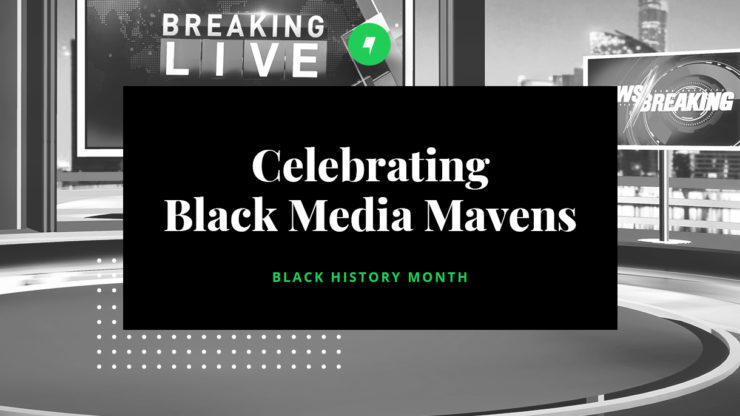February is Black History Month, a nationally recognized month to celebrate and recognize the groundbreaking work and influence of African Americans throughout US history. This month we will all participate in exhibitions, presentations, diversity and inclusion discussion panels, educational programming, and digital media campaigns with the objective of educating society about the challenges and triumphs of African Americans. As members of the Communications field, our contribution to these efforts is to highlight four Black, female media mavens, all of whom broke barriers to become the first.
Carole Simpson
Carole Simpson was the first African American female to anchor a major United States’ network newscast. Graduating from the University of Michigan, Simpson began her career working at WCFL, a Christian radio station, in Chicago. She gained knowledge of the media industry, also making her mark at other Chicago radio stations like WBBM and WMAQ. In 1975, she became the first woman to land a lead anchor position at NBC News. She eventually transitioned to the ABC network and anchored the weekend edition of “World News Tonight” until 2003. Simpson was also the first African American female to moderate a presidential debate. She was the face of the George H.W. Bush, Bill Clinton, and Ross Perot Presidential Debates, broadcast on the ABC network. In 1991, her work as a media personality was officially recognized when she was awarded Journalist of the Year from the National Association of Black Journalists. Simpson served on the Advisory Council of the International Women’s Media Foundation. Her time in the broadcast industry pushed the boundaries for people of color. She appeared on the TV of every American for decades, inspiring many young women, and especially women of color, to go into journalism. In 2006, Simpson retired from ABC and became a college professor in Boston, Massachusetts.
Barbara Proctor
Barbara Proctor was the first African American female to own and fully operate an advertising agency. Proctor joined the creative field of marketing as a copywriter for Post-Keyes-Gardner Agency in 1965. Barbara Proctor passionately made her way into a white and heavily male-dominated industry and wanted to make sure to leave an impactful mark. As a Black employee, clients would seek out her ideas and opinions on how to successfully advertise towards people of color. She felt strongly that agencies were limited in their understanding of African American beauty and household products. Proctor was said to have thought of advertising as a powerful and strategic means of communication between businesses and the American public, but most missed successfully reaching Black Americans. In the 1970s, Proctor, with the help of a U.S. Small Business Administration loan, decided to start her own agency. She started Proctor & Gardner Advertising, using her last and given name. By 1984, her company revenues were over $12 million dollars. Her client roster included Sears Roebuck, Kraft Foods, Alberto-Culver, E.&J., Gallo Winery, and various politicians like Ross Perot. Barbara Proctor set a new standard of business; one where women and people of color were prioritized.
Marvel Jackson Cooke
During the 1920s, Marvel Jackson Cooke was one of four black women enrolled at the University of Minnesota, where she graduated with a degree in English. Cooke’s career kicked off as an assistant to W.E.D. DuBois at the NAACP’s Crisis Magazine. It was here that her journalism skills developed, and she became an advocate for the labor and Civil Rights movements. In 1950, Cooke was hired by The Daily Compass and became the first African American female reporter for a mainstream white-owned newspaper. She was also the only woman on the staff at the time. Cooke helped start the New York City chapter of the Newspaper Journalists labor union; seeking to protect the rights of newspaper journalists. She loved being immersed in the arts by reading, listening to music, and attending plays. She used what she had learned from her experience writing about social and cultural issues to fuel her political activism later in life. She was a natural in positions of leadership, becoming the New York Director of the Council of Arts, Sciences, and Professions and National Legal Defense Secretary of the Angela Davis Defense Committee and later the National Vice Chairman of the American-Soviet Friendship Committee. Cooke lived and led through the Civil Rights Movement as a leading journalist and political advocate of change.
Caroline Robinson Jones
Our final media maven is Caroline Robinson Jones, the first Black female Vice President of a major advertising agency. Jones sought throughout her career to represent people of color in a variety of diverse ways within the field of Communications. She was a graduate of the University of Michigan and began in advertising in 1963 as a secretary and copywriter trainee at J. Walter Thompson’s firm in New York. It was there that she climbed the ladder and rose to creative director. She then went to BBDO Worldwide, where Jones received a history making promotion to Vice President. Robinson Jones set out to use her knowledge and power of the industry to start agencies specializing in minority-based advertising. She was among the first women to do so. She helped open Caroline Jones Advertising, Zebra Associates, Mingo-Jones, and Creative Resources Management—these were some of the first agencies to be solely run by African American executives. Jones was a member of the New York State Banking Board and participated on the advisory committee for the Women’s Bank of NYC. For years, she hosted and moderated radio and television programs such ”Focus on the Black Woman” and ”In the Black: Keys to Success.” Jones is truly the definition of a savvy businesswoman.
These women overcame challenges of race and gender and went on to shape what our industry is today.
We honor their commitment to communications and their passion for a world of creativity. The impact of these media mavens has resulted in an increased awareness of diversity in this field and the start of many more Black-run agencies.
Posted In Company
